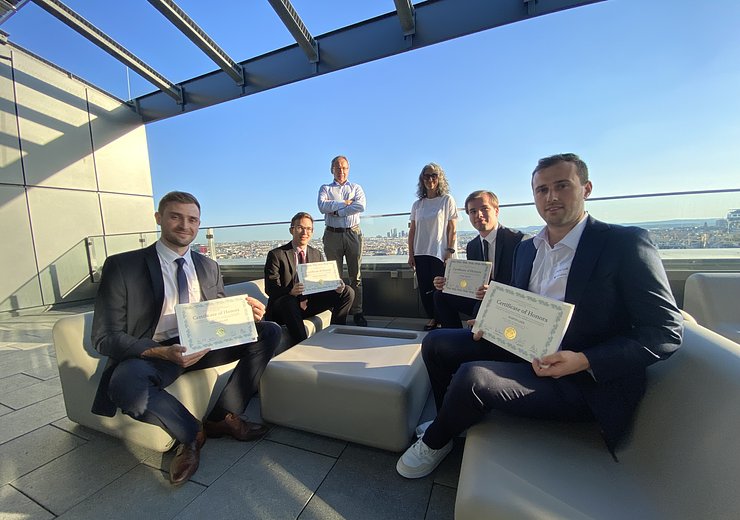The 32nd Epilog—This Time a Hybrid Experience
We honored our most excellent students for their achievements and bestowed them their awards in a hybrid ceremony.

This summer semester, we held our 32nd Epilog ceremony in a hybrid form, virtual via Zoom and with a tiny audience in TUtheSky. On 16 June 2021, our (Zoom) audience witnessed the four best candidates compete for the Distinguished Young Alumn Award as well as the awarding of the prestigious Bachelor with Honors certificates. Moreover, the Best Poster Award winner was announced—elected by TU Wien Informatics staff via online voting.
Host and Vice Dean of Academic Affairs, Stefan Woltran gave the floor to TU Wien Rector Sabine Seidler for her welcome words. TU Wien Informatics Dean Gerti Kappel congratulated all candidates and thanked them for taking the opportunity to study at TU Wien. “We celebrate our best students and try to strive for excellence—for the best of the best.”
Distinguished Young Alumn
The best four candidates were selected by a jury, chaired by Margrit Gelautz and consisting of Radu Grosu, Florian Michahelles, Magdalena Ortiz de la Fuente, and Andreas Rauber. By presenting their excellent diploma theses, the candidates competed for the Distinguished Young Alumn Award.
David Penz convinced the jury with his excellent presentation on “Recommending Reviewers for Theses using Artificial Intelligence”, which, according to the jury, “addressed a challenging problem and gave an excellent and very engaging talk.” He, therefore, received the Distinguished Young Alumn Award endowed with €1,500 for his outstanding research. His diploma thesis, supervised by Horst Eidenberger, aims at developing a recommendation engine driven by state-of-the-art-methodology in the area of artificial intelligence, which optimises the matching and selection process of reviewers by using state-of-the-art deep learning methods.
The other three best graduates who presented their diploma theses were also honored for their excellent achievements. Lisa Kellner wrote her thesis about “Classification of Urban Point Clouds Using 3D CNNs - In Combination with Reconstruction of Sidewalks” and was supervised by Werner Purgathofer. Emmanuel Pescosta presented “SpecBMC - Bounded Model Checker for Speculative Non-Interference,” supervised by Georg Weissenbacher. Philipp Raith researched “Container Scheduling on Heterogeneous Clusters using Machine Learning-based Workload Characterization” and was supervised by Schahram Dustdar.
Celebrating Excellence
Ulrich Schmid, program coordinator of our Bachelor with Honors excellence program for students with outstanding achievements, gave an overview about the program, enabling talented students to deepen their knowledge. It inspires them for scientific research at an early stage in their academic careers and allows them to participate in industry internships and study abroad programs. Stefan Holzer, Martin Ledl, Markus Kirchweger and Rafael Vrecar from Software and Information Engineering were introduced and awarded their Certificates of Honors by Dean of Academic Affairs Hilda Tellioglu, including a personal letter of recommendation by the TU’s rector, stating that they belong to the Top 5 percent of students at TU Wien.
Voting for the Best Poster
For the second time, TU Wien Informatics staff were asked to cast their vote for one of the nominees for the Best Poster Award. The lucky winner of the award, endowed with € 500 and supervised by Eduard Gröller, was Klara Brandstätter with her poster presentation “Building a Sandbox Towards Investigating the Behaviour of Control Algorithms and Training of Real-World Robots,” providing a detailed comparison between simulated and real-world robots and offering a way of controlled and continuous data collection and exploration.
Curious about our other news? Subscribe to our news feed, calendar, or newsletter, or follow us on social media.



